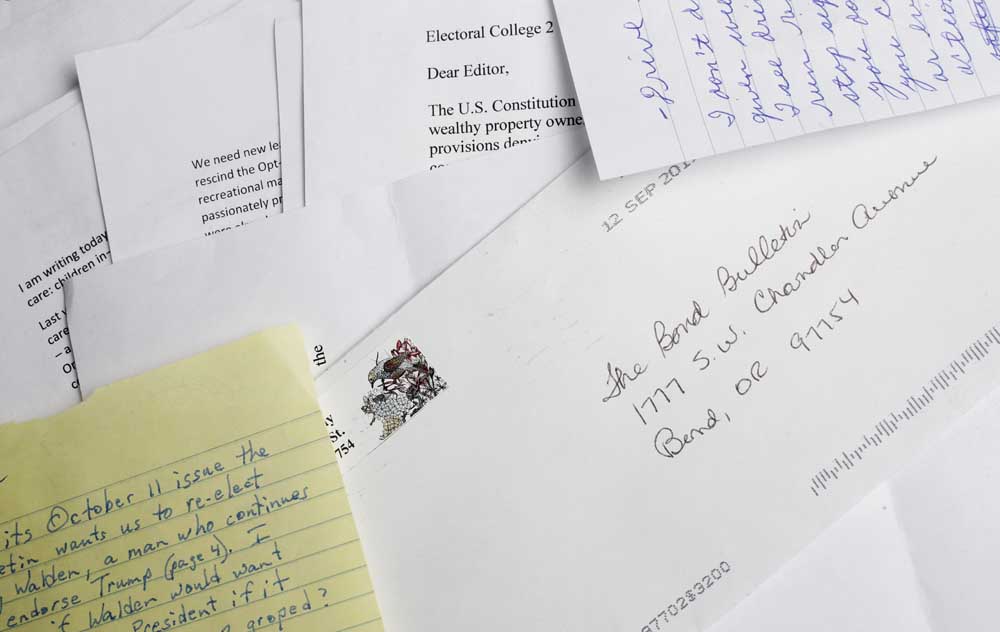Letters: Trump is a success; Good decisions take time; Defending the right to farm
Published 12:00 am Wednesday, July 18, 2018

- (Joe Kline/Bulletin photo)
Trump has been a success
Trump has largely fulfilled his promise to make America great again, but you’d never know it from reading this newspaper or from monitoring the dominant media outlets, which have shown extreme hostility (e.g., 90 percent negative reporting about him).
Trending
Let’s see. Trump’s approval rating is at its highest. Unemployment’s at its lowest level in decades. The economy’s on a roll (GDP’s about 4 percent, almost double that under Obama). American workers are benefiting from the largest tax cut since Reagan. Illegal border crossings were cut in half. ISIS has essentially been destroyed. Most importantly, for America and the world, the North Korean nuclear threat is about to be eliminated, thanks to Trump’s initiative and negotiating skills. He truly deserves a Nobel Peace Prize for such an unprecedented accomplishment, unlike his predecessor, who did nothing but take office to earn his. America’s no longer cowed or pushed around on the world stage, as under the previous administration (e.g., remember Obama’s Syrian “red line”?).
So what substantive issues can the Democrats and their still-angry, biased, media cheerleaders conjure against Trump, especially with the coming midterms? Certainly not the economy, jobs, taxes or defense. Not health care insurance costs, which are mostly attributable to Obamacare. The “Russian collusion” is looking more like an Obama-DOJ, election conspiracy. Maybe manufacture more news about illegal immigration policy? (Same policy under Obama, but it was acceptable then.) Perhaps they’ll just continue with superficial, personal attacks on Trump, his family and friends.
They do have a challenge ahead.
James Strelchun
Bend
Good decisions take time
Trending
I am writing in response to your July 15 editorial regarding land use, “The land use process is broken.” While I agree that no land use decision should take decades, I would like to point out that the decisions you cite did not. I would also ask what alternative you might suggest to “fix” the process. Land use issues are complex and bad decisions are difficult to undo. Their repercussions can be seen and felt for generations in an arid landscape. I would argue that to create and maintain livable cities and neighborhoods, to make wise and balanced land use decisions, takes time. All affected parties must be heard and respected, including those without a voice — wildlife, aquifers, the landscape itself. To do otherwise is irresponsible. What may be broken is the county’s willingness to stand firm and make difficult choices when it comes to wise land use.
Julie Naslund
Bend
Defending the right to farm
Production agriculture by its nature has a number of activities that can create dust, noise and smells that may be unpleasant to neighbors. While these activities can disrupt the daily routine of neighbors to agricultural areas, these activities are essential and routine agricultural practices for producing agricultural products, and under the Right to Farm Law are protected from court decisions that could label these practices nuisances. It also bars local governments and special districts from labeling these practices “nuisances” or “trespasses.”
These essential and routine practices, such as the application of fertilizer and lime, working ground, spreading manure, application of pesticides, and the noise from animals and machinery are all part of producing agricultural products. Despite this, the Right to Farm Law is not a license for growers to do as they wish, nor an excuse for negligence. If growers are to ease the complaints between themselves and urbanites, they must also be courteous and respectful of their practices and to their neighbors.
This isn’t to say accidents don’t happen even when growers are careful, and it’s certainly easy to sympathize with how agricultural activities can disrupt the daily activities of urbanites or households surrounding agricultural areas and cause tension between the two communities. However, the fault lies not with the law, but with lack of cooperation and communication. If agriculturalists are going to ask urbanites to be good neighbors, that same courtesy must be reciprocated.
Tyler Pike
Salem








